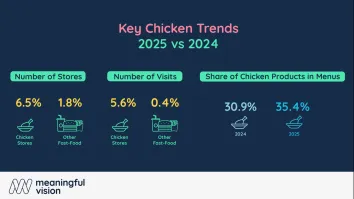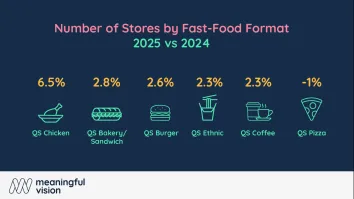Harnessing technology to address food price inflation and empower businesses in the food chain
By Ritam GandhiNine in ten (94%) are worried about the rising cost of food.
Food prices have become a major concern following a year of soaring inflation, straining consumers and businesses. Despite a reduction in the food inflation rate in recent months, persistent factors suggest achieving stable and affordable prices will take time, with some experts predicting the figure to still be as high as 9% by December.
Accordingly, the increasing cost of a trip to the supermarket has begun to take its toll on consumers. A recent YouGov survey carried out for Citizens Advice Scotland found that nine in ten (94%) are worried about the rising cost of food.
At the same time, supermarkets continue to struggle in their efforts to reduce food waste, discarding a staggering 100,000 tonnes of edible food annually in the UK.
To address these concerns, food manufacturers must look to limit costs wherever possible. This entails looking at their operations and finding the best ways to optimise workflows and reduce waste while maintaining profitability. The strategy will call for innovation, and technology is currently the greatest source of innovation.
Sustainable tech at the production stage
Technology can be harnessed across all aspects of the food supply chain, enhancing productivity and reducing avoidable wastage. In turn, digitalisation of the process can result in reduced operational costs and increased financial performance of manufacturers and suppliers, therefore allowing them to share some of the savings with customers feeling the financial strains of high prices.
Indeed, agriculture is already undergoing a digital transformation through advancements such as AI and IoT, leading to increased productivity and output. Yet, while the industry has already seen significant improvements through mechanisation, irrigation, and genetic modification, there are further opportunities for technology to enhance yields and reduce waste.
By leveraging digital technologies such as precision agriculture, drones, satellites, automation, and artificial intelligence, farmers can maximise productivity, improve efficiency, and minimise environmental impact. These technologies enable farmers to make data-driven decisions, optimise resource usage, and detect issues among crop production.
Furthermore, embracing sustainable energy sources like solar and wind power presents an opportunity to reduce reliance on fossil fuels and lower expenses.
Storage, transportation, and retail
The efficient management of storage, transportation, and preparation processes in the food industry plays a pivotal role in determining the final cost of food products. As such, to mitigate the impact on prices, leveraging technology has become increasingly essential. Innovative solutions like IoT sensor tech and blockchain offer significant potential to optimise various aspects of the food chain, driving transparency and efficiency improvements.
For instance, smart technology, such as IoT, facilitates the collection and analysis of data through sensors providing real-time information on food storage conditions, including temperature, humidity, and shelf life.
What's more, testing IoT devices with a suitable management platform doesn't have to be a costly endeavour. By establishing a lightweight framework, businesses can efficiently evaluate the effectiveness of IoT solutions and ROI before scaling up. This approach allows companies to carefully assess the benefits of implementing IoT technologies in the food chain without committing significant upfront resources, therefore proving ROI before scaling up.
At the retail stage, where efficiency directly impacts consumers, advanced inventory management systems can detect and monitor stock levels of perishable commodities using the same in sensor tech, data analytics, and machine learning algorithms. Supermarkets can therefore minimise overstocking and lower the likelihood of food spoiling by precisely forecasting consumer demand and changing orders accordingly.
In the case of overstocking issues, zero-waste apps and subscription platforms continue to facilitate the redistribution of surplus food from supermarkets to local food banks, shelters, or community organisations. Online platforms or apps can connect supermarkets with nearby recipients, streamlining the process of food donation and reducing administrative barriers.
Harnessing tech
The potential of technology to address and mitigate food price inflation is immense, spanning every level of the food chain. By harnessing the power of tech-driven innovation, businesses can establish lean and efficient workflows that not only drive long-term profitability but also contribute to sustainability efforts, ultimately reducing the impact of food price inflation.
Just as technology companies continually strive to develop new and improved solutions, non-tech businesses must recognise and embrace the potential benefits that these solutions offer. It's crucial for businesses across various sectors to actively explore and adopt tech-driven innovations wherever possible. By taking this approach, the food manufacturing industry can reduce costs, and remain competitive while alleviating the financial strains faced by consumers.


























